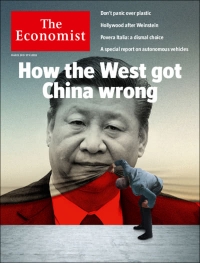 Last weekend China stepped from autocracy into dictatorship. That was when Xi Jinping, already the world’s most powerful man, let it be known that he will change China’s constitution so that he can rule as president for as long as he chooses—and conceivably for life. This is not just a big change for China (see article), but also strong evidence that the West’s 25-year bet on China has failed, The Economist observes:
Last weekend China stepped from autocracy into dictatorship. That was when Xi Jinping, already the world’s most powerful man, let it be known that he will change China’s constitution so that he can rule as president for as long as he chooses—and conceivably for life. This is not just a big change for China (see article), but also strong evidence that the West’s 25-year bet on China has failed, The Economist observes:
After the collapse of the Soviet Union, the West welcomed the next big communist country into the global economic order. Western leaders believed that giving China a stake in institutions such as the World Trade Organisation (WTO) would bind it into the rules-based system set up after the second world war (see Briefing). They hoped that economic integration would encourage China to evolve into a market economy and that, as they grew wealthier, its people would come to yearn for democratic freedoms, rights and the rule of law.
“Today the illusion has been shattered. In reality, Mr Xi has steered politics and economics towards repression, state control and confrontation,” it adds.
 China’s rise as a superpower could possibly fuel its own imperialist ambitions in the region, using what a National Endowment for Democracy report calls Sharp Power to compel small states to submit to its will, reports suggest.
China’s rise as a superpower could possibly fuel its own imperialist ambitions in the region, using what a National Endowment for Democracy report calls Sharp Power to compel small states to submit to its will, reports suggest.
To counter China’s sharp power, Western societies should seek to shed light on links between independent foundations, even student groups, and the Chinese state, The Economist asserts.
 West in a funk
West in a funk
“It’s dangerous when there aren’t any rules left that give other people a shot at power or that tell you when to end your own time in power,” says Columbia University’s Andrew Nathan (left), a National Endowment for Democracy board member. “It potentially destabilizes the system, not only for the succession after Xi Jinping, but down the road even after that.”
Today the West is in a funk. It is a time for serious thinking about how to balance China more effectively, with a united front and without losing sight of the strengths of democratic, accountable government, a free press and independent courts, The Economist asserts.







